Harold’s Survivor Story
Twenty Years and Counting . . . .
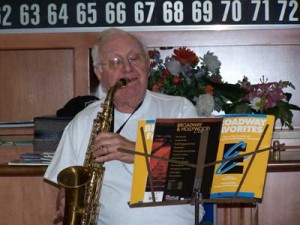 My name is Harold Riffer and I am an 18 year survivor of Esophageal Cancer. I smoked cigars for a number of years and often suffered from indigestion. In the summer of 1993, I had a huge esophageal bleed that put me a coma and sent me to intensive care for a week. In the follow up when things were clean again, it was determined that the bleed came from esophageal cancer. I then had major surgery, most of my esophagus removed and my stomach connected to what was left of the esophagus. After that I was tested via endoscopy every three months, then once a year, and after 15 years every two years. The results were normal. I had no major problems from the surgery other that keeping my head higher than my body with a wedge pillow or other means when sleeping. I’m able to eat all kinds of foods, but at night, I take Prilosec.
My name is Harold Riffer and I am an 18 year survivor of Esophageal Cancer. I smoked cigars for a number of years and often suffered from indigestion. In the summer of 1993, I had a huge esophageal bleed that put me a coma and sent me to intensive care for a week. In the follow up when things were clean again, it was determined that the bleed came from esophageal cancer. I then had major surgery, most of my esophagus removed and my stomach connected to what was left of the esophagus. After that I was tested via endoscopy every three months, then once a year, and after 15 years every two years. The results were normal. I had no major problems from the surgery other that keeping my head higher than my body with a wedge pillow or other means when sleeping. I’m able to eat all kinds of foods, but at night, I take Prilosec.
What I often remember and tell people is that blood that goes through the digestive system is black! I know because I lost six pints and almost bled to death.
Ken’s Survivor Story
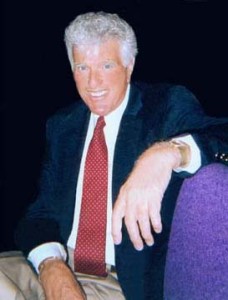 I’ve survived cancer twice. In my first cancer, a squamous cell tumor was removed from my throat which was followed with seven weeks of subsequent radiation. The radiation took care of the first cancer. A year later, while having my annual physical, doctors performed a routine fecal blood test to be positive. They said it was probably a bleeding ulcer and that it could be healed with antibiotics. After having an Upper GI, an MRI, a CAT scan, and a PET scan, the doctor called to tell me he had some good news, and some bad news. I asked him to give me the bad news first. He said, “You have esophageal cancer.”
I’ve survived cancer twice. In my first cancer, a squamous cell tumor was removed from my throat which was followed with seven weeks of subsequent radiation. The radiation took care of the first cancer. A year later, while having my annual physical, doctors performed a routine fecal blood test to be positive. They said it was probably a bleeding ulcer and that it could be healed with antibiotics. After having an Upper GI, an MRI, a CAT scan, and a PET scan, the doctor called to tell me he had some good news, and some bad news. I asked him to give me the bad news first. He said, “You have esophageal cancer.”
I asked him to tell me the good news. He said that it was only two millimeters and that they could remove my esophagus, and get it all. My cancerous esophagus was removed, along with my spleen and connecting lymph nodes. The surgeon entered the room when I came out of the anesthesia and told me I was the luckiest man in the world, as there were no cancer cells in the connecting lymph nodes.” I told him I was blessed first and lucky second.
So this time, no radiation or chemo was necessary. There are hardly any symptoms with esophageal cancer; only a constant GERD (heartburn), at night, and some coughing. Insurance companies hustle you out of the hospital so fast, there’s hardly time for therapists to teach you how to adapt to your new digestive system. I had a feeding tube in my side for seven weeks at home, and when they took it out I had to learn how to eat without an esophagus. I could only have one spoonful of each food: applesauce, a mashed veggie, and some pureed hamburger, every four hours for two weeks.
My new way of eating included the ‘dumping syndrome’ which included a great deal of pain when I ate. I had to follow small meals with a liquid pain killer. I tolerated the pain. I was happy to be alive. That was over ten years ago.
Gary’s Survivor Story
Cancer and Me and Regina Makes Three
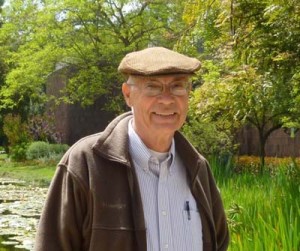 I am including my wife, Regina, in the title of my fight to survive esophageal cancer, because I truly do not believe I would be a survivor without her.
I am including my wife, Regina, in the title of my fight to survive esophageal cancer, because I truly do not believe I would be a survivor without her.
It had been a bad Fall. My youngest brother, David, had been diagnosed with stage four leukemia in October of 2008 (he died a year later at age 58), and my older brother Bob had died in December, 2008. I was not feeling well either. My symptoms were extreme fatigue, difficulty swallowing, and blood in my stool.
My PCP, Dr. Susan Whitely, had her suspicions and scheduled me for a colonoscopy and an upper endoscopy. My gastroenterologist, Dr. Stephen Glouberman, called December 26, 2008 to tell me I had esophageal cancer and that I needed to schedule surgery as soon as possible. He gave me the name of a highly-regarded surgeon who could not see me for a month, and I was urged to meet with a younger associate of his. We did so and were given a rather pessimistic outlook of my chances of survival – even if the surgery was successful, the cancer would probably kill me.
We began desperately to search for other options and interviewed a number of other surgeons, none of whom inspired great confidence in us despite their confidence in themselves. We received a ray of hope when an oncology patient advocate at the University of Arizona Medical Center in Tucson informed us that “her guys” were having as much success with chemo and radiation as they were with surgery. She referred us to a wonderful team in Phoenix, hematologist/oncologist Maqbool Halepota, and radiation oncologist Michael Sapozink. We gladly opted not to have the surgery. Instead I underwent a six-week course each of chemo and a specialized form of radiation called tomo-therapy.
After about three weeks of radiation, I started losing blood. We were very worried and I was admitted to the hospital, but an upper endoscopy showed that the reason for the blood loss was that the tumor was breaking up. Dr. Glouberman was thrilled to be able to tell me that. Subsequent PET scans and upper endoscopies have showed no signs of cancer, and I remain cancer free more than two years later. A benchmark in my recovery came this spring when Dr Halepota authorized the removal of my porta-catheter. It had been installed to facilitate the administration of chemo and this was an expression of confidence on his part that I would not need chemo again.
But this is only part of the story. The rest is, I think, just as important to my success so far.
In order to mitigate the side effects of the chemo and radiation, we started seeing a naturopath, Dr. Dana Keaton. She had helped a friend of ours cope with the side effects of her breast cancer. With a treatment methodology that included acupuncture and supplements, I experienced few of the symptoms often associated with cancer treatment.
Then (for a second time) my wonderful PCP, Dr. Susan Whitely, saved my life when she suspected I had developed blood clots in my lungs, a not-uncommon side effect of cancer. After a short hospital stay, I was put on a blood thinner and had to be on an oxygen generator for about six weeks. My naturopath gave me additional supplements to dissolve the clots. Presently, I am taking herbal supplements that build up my immune system to fight any lingering cancer cells.
We also had been doing a lot of research and read Dr. Colin Campbell’s “The China Study”, which documents the strong correlation between our western diet and cancer. Dr. Campbell’s research, funded over many years by the National Institute of Health (NIH), showed that laboratory rats, when fed a diet of casein, which is the main protein in cow’s milk, invariably developed cancerous tumors and died within two years. Almost all rats fed an alternate diet of plant-based proteins did not develop tumors and were still alive and healthy after two years. This remarkable finding led to more experimentation over a number of years and the researchers found they could literally turn tumors on and off, and even reverse them, by regulating which proteins they gave the rats. When rats that had been fed the milk protein developed tumors, the tumors stopped growing and often shrank when the rats were switched to plant-based proteins. Dr. Campbell and his associates also did a huge research study on the diets of over 700,000 people in China. In the study, funded by the U,S. and Chinese governments, they discovered that in areas where very little animal protein was consumed, very little cancer existed.
Dr. Campbell’s well-documented research convinced us to adopt a vegan diet in our all-out effort to fight cancer. And I believe a vegan diet (a vegan is a vegetarian who also avoids dairy products) may have been beneficial to the early breaking up of my tumor and remains a central part of our new life-style. Regina took some free vegan cooking classes at the Wellness Center to get us started. We would strongly urge anyone battling cancer to read Dr. Campbell’s remarkable book.
Given the original prognosis, we feel my recovery was a true miracle. Not only do we have some wonderful doctors to thank, but also the love and encouragement of friends and family, and the hundreds of prayers which were said on our behalf. We continue to attend the EC support group at Good Sam in order to encourage others. Please feel free to call us for more information and encouragement. Gary and Regina Graybill, 602-2796435.
Rich’s Survivor Story
On a warm day in June of 2004, I experienced severe chest pain, which I attributed to indigestion—a condition I’ve had for most of my adult life. My wife was not convinced that was the problem. She immediately called 911 and the paramedics took me to St. Joes where they performed a cardiac evaluation which was negative. My primary care physician referred me for an upper GI exam which showed a lesion in the lower part of the esophagus. A subsequent biopsy revealed a T2 NO adenocarcinoma of the distal esophagus. After several consultations with cardiothoracic surgeons, we decided on a transhiatal esophagogastrectomy. The procedure was performed on September 27, 2004, by Dr. Louis Lanza, at Mayo hospital. They removed the esophagus and a third of the stomach. I spent a total of eight days in the hospital. Tests had shown that the tumor was contained and had not spread to any surrounding lymph nodes. After discussions with Dr. Lanza, we decided against chemotherapy treatment.
Now, I am now back to my regular routine of racquetball, golf, working several days a week at the Legal Defender’s Office, and traveling. It was such a frightening time after the initial diagnosis while we researched the disease, searched for the best medical care we could find, and battled with our insurance company. My wife and I credit my miraculous recovery to three things: we discovered the tumor early, we had the very best surgeon on earth, and God listened to all of the prayers that bombarded heaven in my behalf!
Laura Laguna’s Survivor Story
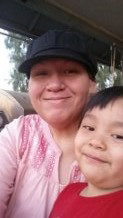 I was diagnosed with esophageal cancer two months after I turned 40 years old in July of 2014. I thought I was doing super by participating in a challenge for losing weight at work and a program to eat healthier at my doctor’s office. I was eating healthier and exercising by taking the stairs to my desk at work, but I was also getting sick when I ate food—nausea and pain even when I drank water. I thought many things: maybe it was acid reflux, heart burn, indigestion. It turned out to be a tumor in my esophagus that was the cause of pain and discomfort.
I was diagnosed with esophageal cancer two months after I turned 40 years old in July of 2014. I thought I was doing super by participating in a challenge for losing weight at work and a program to eat healthier at my doctor’s office. I was eating healthier and exercising by taking the stairs to my desk at work, but I was also getting sick when I ate food—nausea and pain even when I drank water. I thought many things: maybe it was acid reflux, heart burn, indigestion. It turned out to be a tumor in my esophagus that was the cause of pain and discomfort.
Thankfully, my team of doctors knew exactly where to refer me and what steps to take. I had chemotherapy and radiation to shrink the tumor and, since then, the tumor has been removed in November 2014. I am currently on a second round of chemotherapy to kill off any cancer that was left. After the third session of chemotherapy, I’ll be getting testing done to check on the progress of the cancer. I’m hoping for great news and to hear that the cancer has been obliterated.
My most important goal is to be cancer free, and then I want to return to work in the next couple of months and get a small SUV so that I can start my road trips on my days off. I want to start to cross off some of those bucket list locations. What a better time then now to start living again by exploring the U.S. in my car and, most important, be cancer free. That would be a great start to the second half of my life.
Hugh’s Survivor Story and Journey
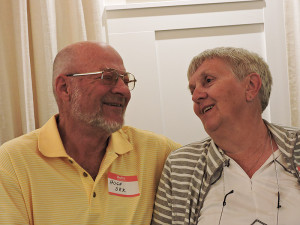 For more than 25 years I lived with a hiatal hernia and acid reflux. I controlled it by using medications – first Tums and then a prescription pill.
For more than 25 years I lived with a hiatal hernia and acid reflux. I controlled it by using medications – first Tums and then a prescription pill.
In the spring of 2013, at the time of my annual physical, I had been feeling uncomfortable after eating so I mentioned it to my Primary care Physician, Dr. Timothy Burns at Banner Arizona Medical Center. He ordered an Endoscopy. It was performed by Dr. Deepa Shah, a gastroenterologist at the outpatient center at the Medical Center. I was still in ”la-la land” after the procedure but my wife, Janice, tells me that Dr. Shah came into the recovery area with the terrible news – cancer of the esophagus.
Dr. Shah was a Godsend and took charge of what was to happen. She immediately arranged for an oncologist, Dr. Kaur; other procedures with Dr. Pitea at Dell Webb Hospital in Sun City West, another gastroenterologist, and she was determined that I would see Dr. Ross Bremner, a noted and terrific Thoracic Surgeon at St. Joseph’s Hospital in Phoenix. Dr. Shah’s office also helped immensely with getting my insurance company to authorize and allow me to see Dr. Bremner, as he was not in my insurance network.
After several tests, CT scans, a PET scan and 2 endoscopic ultrasounds by Dr. Pitea, it was determined that the cancer had not spread into the lymph nodes or other organs. And I was still in Stage 1. That was great news as Janice and I had shed many a tear before this.
It was determined that my course of treatment would be radiation for 5 weeks (Monday through Friday); chemotherapy for 2 weeks (the 1st and last weeks during radiation, and then rest the body for a month. Then surgery by Dr. Bremner to remove what cancer remained.
I had my surgery on September 23, 2013, at st. Joseph’s Hospital in Phoenix.
Some hi-lites and low-lites:
I was in surgery for over 7 hours and in the hospital for 22 days. I don’t remember for sure but I think 6 days were in intensive care.
They removed most of my esophagus, took mv stomach and stretched It to serve as my esophagus.
Had many, many tubes coming in and out of my body plus many monitoring vital functions. Slowly, day by day, they were removed. What a great feeling when the last tube was finally removed. When I got home from the hospital, I had to use a feeding tube during the night for several weeks. I was fortunate to be able to eat soft foods in the hospital, which continued after I got home.
I still get chills and well up when I think about the people who took care of me during my ordeal. At the top of the list is my wife, Janice, whom I can never repay for what she did for me. Also, all the nurses, aides, technicians, and Dr. Bremner and his medical team. Without him, I wouldn’t be here today and for whatever time I have left – I thank Dr. Bremner.
My recovery has gone well. I’ve lost about 35 lbs. and I can’t eat like I used to. But I’m back playing golf, and just enjoying life. The latest endoscopy performed by Dr. Bremner in January showed no cancer. Hopefully I can say that for many more years.
I am so thankful for the great doctors that I had and have. Also, for the friends, family, and neighbors for their kind words, thoughts, and prayers.

January 27, 2015 at 7:20 pm
Thanks for sharing.